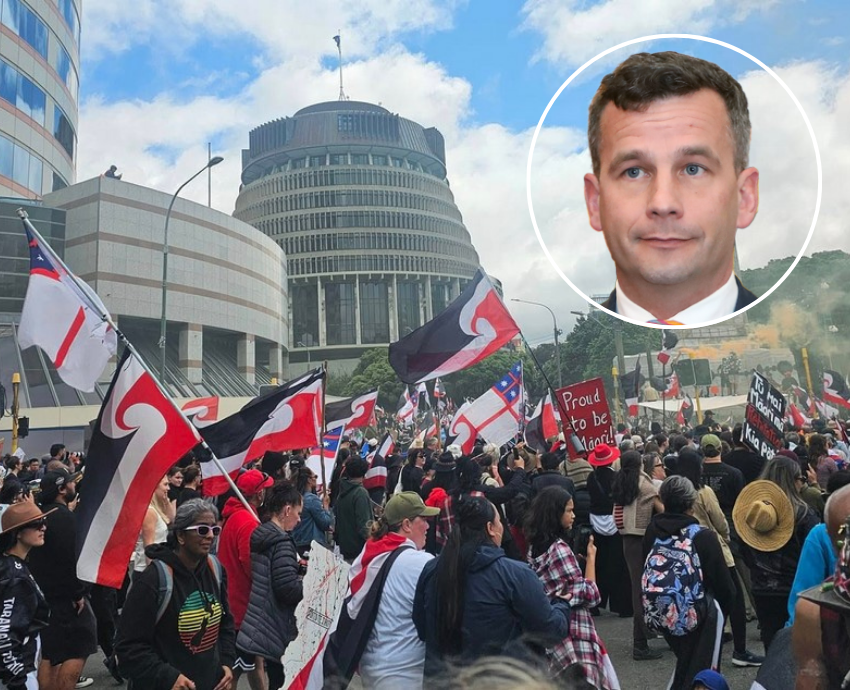
Aotearoa New Zealand celebrated Waitangi Day on February 6, marking 185 years since the signing of the country’s founding document te Tiriti o Waitangi (The Treaty of Waitangi).
Te Tiriti is named after the township in the far north of the country where it was first signed in 1840.
The agreement was signed by Māori chiefs and representatives of the British Crown. It outlines a set of principles upon which the new country was founded, and is instrumental in upholding Māori rights.
This year’s celebrations were held during a period of strained race relations between Māori and the Crown.
Since coming to power in November 2023, Aotearoa’s conservative coalition, led by the National party, has consistently attacked and undermined the rights of Māori people.
The minor parties of the coalition, ACT and NZ First, have managed to implement some of their most right-wing, racist policies as part of their coalition agreements with National.
The Māori Health Authority — which was established by the previous Labour government to provide equitable health outcomes for Māori — has now been dismantled. Government entities have been directed to communicate primarily in English instead of te reo Māori (Māori language), and Māori names have been removed from government agencies.
The most divisive policy, however, has been the controversial Treaty Principles Bill, which was introduced as part of ACT’s coalition agreement with National.
ACT’s bill seeks to “redefine” the principles of te Tiriti in a way that would fundamentally change the partnership between Māori and the Crown. It aims to establish the Crown’s sovereignty over Māori once and for all.
The bill is not expected to become law, however, as ACT’s coalition partners have stated they will not support it beyond its first reading in parliament.
Protests against the bill culminated in December’s historic hīkoi mō te Tiriti (march for the Treaty), organised by the activist group Toitu te Tiriti (Honour the Treaty). Tens of thousands of people marched the length of the North Island in what is believed to be the largest protest ever to arrive at parliament in Wellington.
Thousands gather each year on the treaty grounds in Waitangi to celebrate the national holiday. Events are held over several days including concerts, panels and cultural performances.
David Seymour — leader of the ACT party and the main proponent of the bill — is part-Māori. His hapū (sub-tribe) Ngāti Rēhia formally requested that he not attend commemorations in Waitangi this year, saying they “do not believe it would be an appropriate decision” while the bill is being progressed.
Seymour turned up anyway, as parliament was invited by the Waitangi National Trust.
A pōwhiri (welcome ceremony) for ministers was held on the eve of Waitangi Day and Seymour’s speech there was, predictably, controversial.
Māori wāhine (women) led a protest against him, turning their backs and singing over him while he was speaking.
His microphone was twice removed, and then returned, ensuring the crowd could not hear large parts of his provocative address.
Responding to the protests he said: “Here are some problems that you can’t turn your back on because the numbers do not lie. Māori home ownership. Māori school attendance. Māori victimisation by criminals. Māori unemployment. Māori income and life expectancy … None of it is getting better.”
Seymour’s disingenuous comments highlight that the only “special treatment” Māori receive in Aotearoa are worse outcomes across multiple social, economic and health indicators.
In a break from tradition, Prime Minister Christopher Luxon chose to stay away from the commemorations at the treaty grounds. Instead, he attended a Waitangi Day event at Ōnuku marae near Akaroa in the South Island.
It was controversial, given Luxon admitted in December that the relationship between the Crown and Māori is “probably worse” since the coalition government came to power.
His appearance in Akaroa was disrupted, however, by pro-Palestine protesters. They heckled and chanted, drowning out his speech from outside the marae: one protester was eventually arrested for breaching the peace.
Labour leader Chris Hipkins criticised Luxon’s decision not to travel to the far north, saying he “should be at Waitangi to face division he’s allowed”.
On Waitangi Day, hundreds gathered at the treaty grounds for the annual dawn service. Māori elders, politicians and church leaders gave speeches and led prayers.
The ceremony is traditionally not a political event. However, this years’ service featured a mixture of reflection and political discourse, with multiple speakers calling for a deeper commitment to te Tiriti.
The Human Rights Commission's co-chief executive Julia Whaipooti said afterwards that the spirit of Waitangi remains strong despite the charged political atmosphere.
She described the morning’s events as a “really beautiful gathering of people”, highlighting how tangata whenua (indigenous people) and non-Māori had come together to “recognise the promises of te Tiriti o Waitangi”.